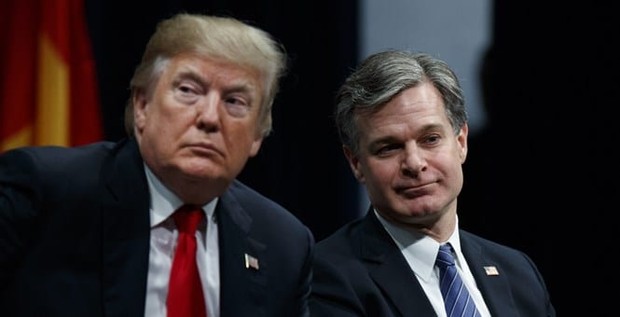
President Donald Trump sits with FBI Director Christopher Wray during the FBI National Academy graduation ceremony, Friday, Dec. 15, 2017, in Quantico, Va. (AP Photo/Evan Vucci)
A couple of days ago, the New York Times ran a rather stunning piece on FBI surveillance of the Trump campaign. The piece is widely suspected to be a prophylactic leak designed to give the FBI and Justice some cover from what is expected to be a scathing Department of Justice Inspector General Report on the conduct of the FBI and Justice during the 2016 election. Be sure to read the overview by GBenton.
This is the basic outline of the story. The FBI, based on a semi-drunken conversation between George Papadopoulos and an Australian diplomat, Alexander Downer, opened an investigation of the Trump campaign. What is missing from the story is any mention of the Trump dossier which we know was briefed to the FBI on July 5, nearly a month before the Papadopoulos conversation jumped the Atlantic and the shark. As the investigation grew, eventually four members of the Trump campaign- Michael T. Flynn, Paul Manafort, Carter Page and Papadopoulos–were placed under some sort of surveillance. Eventually, Carter Page was the subject of a FISA warrant. This surveillance continued even while Flynn and Manafort were on the transition team. And, significantly,
A year and a half later, no public evidence has surfaced connecting Mr. Trump’s advisers to the hacking or linking Mr. Trump himself to the Russian government’s disruptive efforts.
The story seems to confirm what Fusion GPS founder Glenn Simpson said in his testimony to the Senate Judiciary Committee, that the FBI had an informant in the campaign:
When @realDonaldTrump tweeted this hour about reports of FBI having an informant inside his campaign, he was referring to details in this column by @AndrewCMcCarthy https://t.co/abIS12lQKi
— Hugh Hewitt (@hughhewitt) May 17, 2018
From the New York Times:
The F.B.I. obtained phone records and other documents using national security letters — a secret type of subpoena — officials said. And at least one government informant met several times with Mr. Page and Mr. Papadopoulos, current and former officials said. That has become a politically contentious point, with Mr. Trump’s allies questioning whether the F.B.I. was spying on the Trump campaign or trying to entrap campaign officials.
The thrust of the article is that the FBI treated Trump with kid gloves and went way too easy on him:
But underpinning both cases was one political calculation: that Mrs. Clinton would win and Mr. Trump would lose. Agents feared being seen as withholding information or going too easy on her. And they worried that any overt actions against Mr. Trump’s campaign would only reinforce his claims that the election was being rigged against him.
This NYT story says that FBI was worried that if it came out they were spying on Trump campaign it would "only reinforce his claims that the election was being rigged against him." Yes, I can imagine that would reinforce those claims. I mean, !!! !!! !!! !!!
— Mollie (@MZHemingway) May 16, 2018
Mollie Hemingway, in The Federalist, says there are ten key points to this story:
1. FBI Officials Admit They Spied On Trump Campaign
2. Terrified About Looming Inspector General Report
3. Still No Evidence of Collusion With Russia
None of that is a shock. But now we enter uncharted waters.
4. Four Trump Affiliates Spied On
5. Wiretaps, National Security Letters, and At Least One Spy
We know there was someone on the 2008 McCain campaign who tickled the whiskers of counter-intelligence agencies. McCain was privately approached and the person was removed from the campaign. Trump was not extended this courtesy. There is exactly one reason why: the dossier. That would be the dossier that everyone is claiming was irrelevant to the whole Russia probe. As civilians, we have no way of finding out how many other campaigns have had members subjected to counterintelligence surveillance during an election and during a presidential transition. I’ll go out on a limb here and guess that prior to 2016 the answer is zero.
6. More Leaks About a Top-Secret Government Informant
Oddly enough, the FBI and Justice are telling the New York Times and Washington Post information they won’t share with Congress.
7. Ignorance of Basic Facts
Maybe. But, when it comes to the New York Times, never attribute to ignorance what can also be explained by duplicity and a desire to help the Democrats. Mollie identifies several things they get wrong.
The problems begin in the second sentence, which claims Peter Strzok and another FBI agent were sent to London. The New York Times reports that “[t]heir assignment, which has not been previously reported, was to meet the Australian ambassador, who had evidence that one of Donald J. Trump’s advisers knew in advance about Russian election meddling.”
Yes, it has been reported.
It’s also inaccurate to say this [the Papadopoulos conversation] was “election meddling,” necessarily. Clinton had deleted 30,000 emails that were housed on her private server even though she was being investigated for mishandling classified information.
This is a key point in nearly all reporting. There is an insistence that Papadopoulos knew in advance of the hacking of the DNC server. By the time he was drinking with the Australian, it was well known that there were some 30,000 Clinton emails were missing AND that her personal email system had been compromised by foreign intelligence. The easiest explanation is that is what Papadopoulos was talking about but that doesn’t fit the narrative.
The story claims, “News organizations did not publish Mr. Steele’s reports or reveal the F.B.I.’s interest in them until after Election Day.” That’s demonstrably untrue. Here’s an October 31, 2016, story headlined “A Veteran Spy Has Given the FBI Information Alleging a Russian Operation to Cultivate Donald Trump.” It is sourced entirely to Steele.
They shamefully spin Strzok’s enthusiastic text messages as nothing:
The New York Times writes, “Crossfire Hurricane began exactly 100 days before the presidential election, but if agents were eager to investigate Mr. Trump’s campaign, as the president has suggested, the messages do not reveal it. ‘I cannot believe we are seriously looking at these allegations and the pervasive connections,’ Mr. Strzok wrote soon after returning from London.”
There are multiple problems with this claim. For one, Strzok wrote that text in all caps with obvious eagerness. As the Wall Street Journal noted months ago, “Mr. Strzok emphasized the seriousness with which he viewed the allegations in a message to Ms. Page on Aug. 11, just a few days before the ‘insurance’ text. ‘OMG I CANNOT BELIEVE WE ARE SERIOUSLY LOOKING AT THESE ALLEGATIONS AND THE PERVASIVE CONNECTIONS,’ he texted.”
For another, Strzok repeatedly talked about how important and time-sensitive he felt the investigation was. As Andrew McCarthy highlighted in his deep look at some of these texts, as Strzok prepared for his morning flight to London, he compared the investigations of Clinton and Trump by writing, “And damn this feels momentous. Because this matters. The other one did, too, but that was to ensure that we didn’t F something up. This matters because this MATTERS.”
And this:
Another New York Times error was the claim, repeated twice, that Page “had previously been recruited by Russian spies.” In fact, while Russian agents had tried to recruit him, they failed to do so, and Page spoke at length with the FBI about the attempt before the agents were arrested or kicked out of the country.
The New York Times falsely reported that “Mr. Comey met with Mr. Trump privately, revealing the Steele reports and warning that journalists had obtained them.” Comey has told multiple journalists that he specifically did not brief Trump on the Steele reports. He didn’t tell Trump there were reports, or who funded them. He didn’t tell him about the claims in the reports that the campaign was compromised. He only told him that there was a rumor Trump had paid prostitutes to urinate on a Moscow hotel bed that the Obamas had once slept in.
And this:
It's the Allegation That Will Not Die. https://t.co/rBX3bQPaFa and https://t.co/FFHs7HgIif pic.twitter.com/6VSPloeztw
— Byron York (@ByronYork) May 16, 2018
8. Insurance: How Does It Work?
Indeed, it is looking more and more like the Russia collusion stuff is a backup plan hatched to hamper a Trump administration if not result in his impeachment.
9. Eavesdropping, Not Spying, And Other Friendly Claims
The story could not be friendlier to the FBI sources who are admitting what they did against the Trump campaign. A few examples:
“[P]rosecutors obtained court approval to eavesdrop on Mr. Page,” The New York Times writes, making the wiretapped spying on an American citizen sound almost downright pleasant. When Comey briefs Trump only on the rumor about the prostitutes and urination, we’re told “he feared making this conversation a ‘J. Edgar Hoover-type situation,’ with the F.B.I. presenting embarrassing information to lord over a president-elect.” Reporters don’t ask, much less answer, why someone fearing a J. Edgar Hoover-type situation would go out of his way to create an extreme caricature of a J. Edgar Hoover situation.
The story also claimed, “they kept details from political appointees across the street at the Justice Department,” before using controversial political appointee Sally Yates to claim that there was nothing worrisome. In fact, the subtext of the entire story is that the FBI showed good judgment in its handling of the spying in 2016. Unfortunately, the on-the-record source used to substantiate this claim is Yates.
10. Affirms Fears of Politicized Intelligence
Indeed. In both the Clinton and Trump cases the FBI acted as a political actor. With Clinton, they knew she was “too big to jail” and were focused exclusively on looking like they were doing something while, in fact, doing nothing for fear of Clinton’s vengeance when she ascended the throne. With Trump, they focused on keeping an investigation alive even though there was no evidence sustain it in order to use it as a weapon if Trump got lucky. He did and they have.
Funny how quaint this feels now:
Throwback to April 2017. Tapper Reacts To Poll: "Fake News" That Obama Admin Spied On Trump Campaign https://t.co/hCITQfw3Mw
— Mollie (@MZHemingway) May 16, 2018
=========
Like what you see? Then visit my story archive.
Follow @streiffredstate
I’m on Facebook. Drop by and join the fun there.
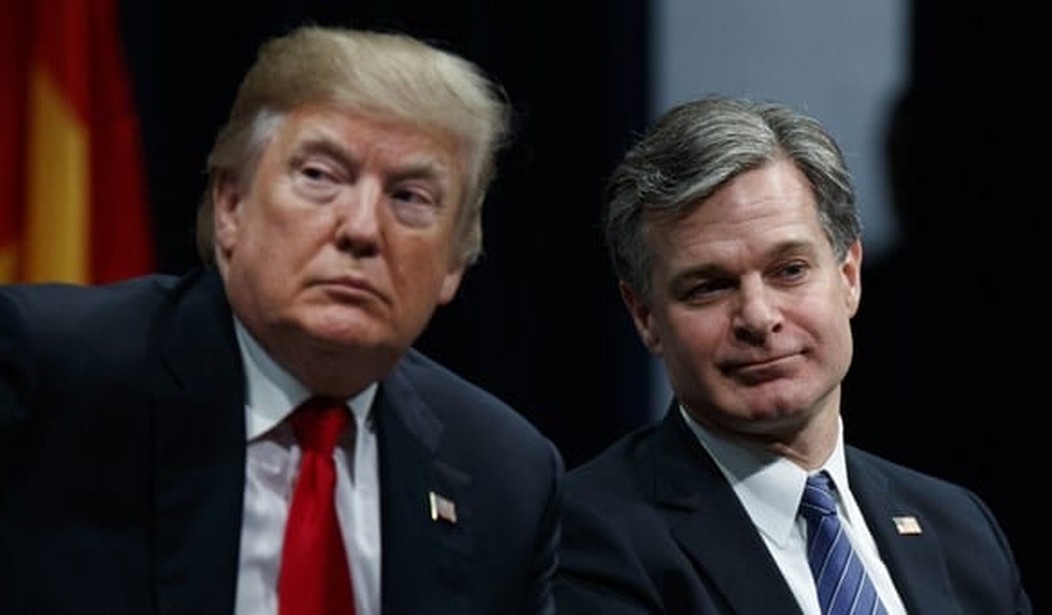
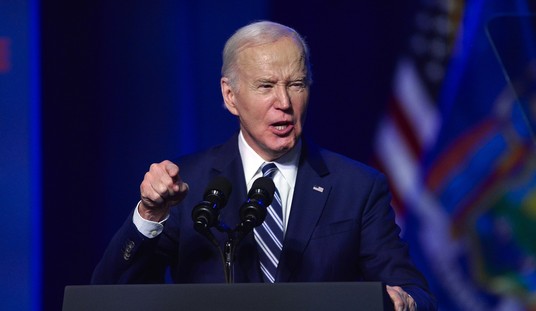



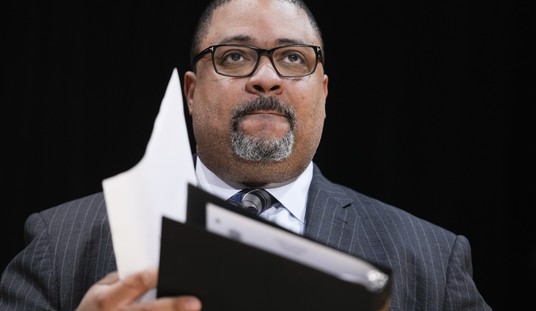
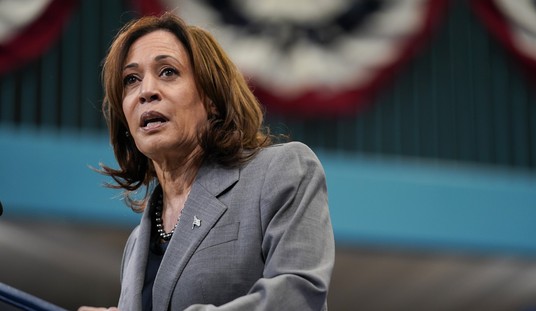


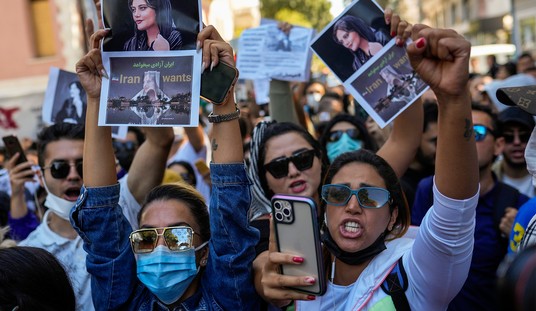

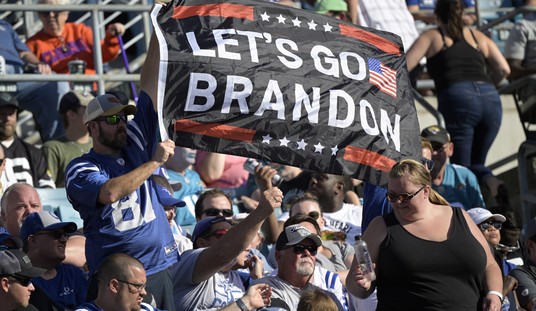

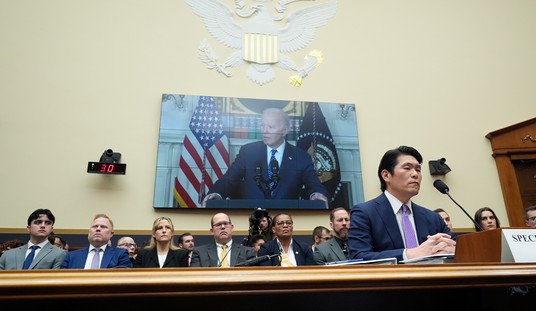
Join the conversation as a VIP Member